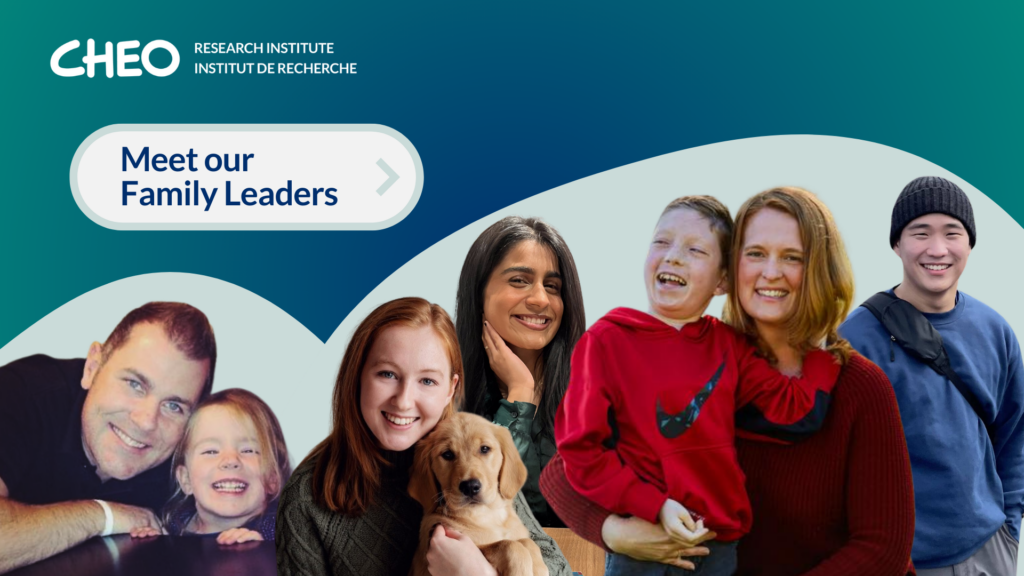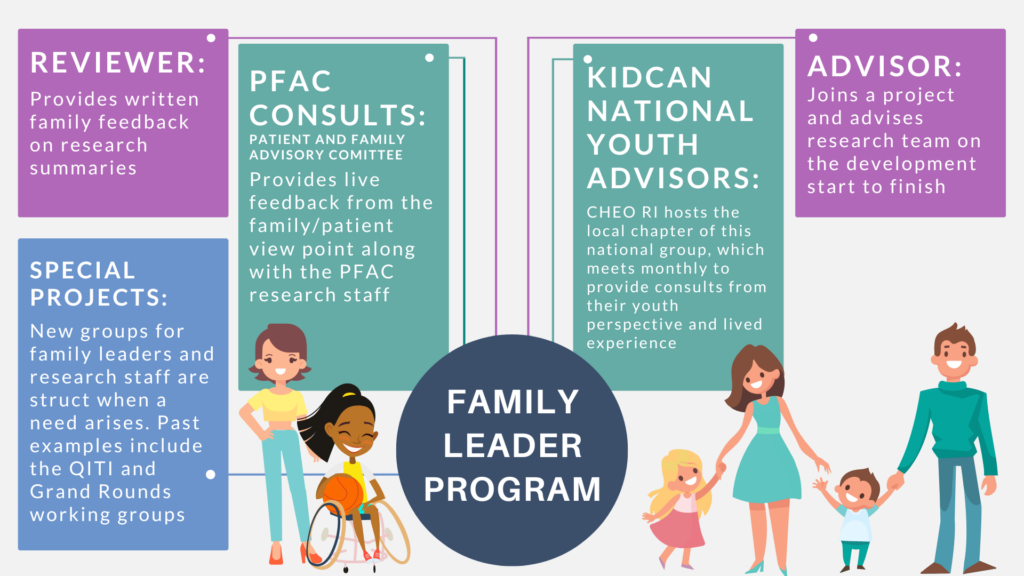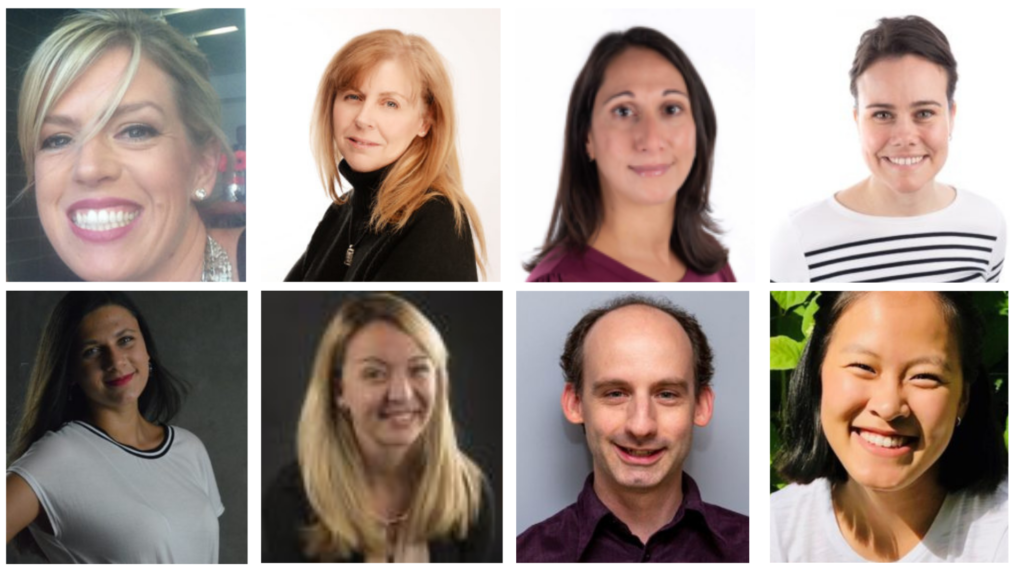Did you know that children, youth and families can have an active role in CHEO research – beyond consenting to participate in a study? You can help to determine the research questions to be answered, influence the study design, and so much more!
This video shares many ways that the general public can help to make discoveries to inspire the best life for every child and youth.

CHEO RI Research Family Leader Program
You can be a partner in the research process at CHEO. One way is through our Research Family Leader Program. We are currently looking for CHEO family members who believe in the impact research can have on the care we provide. As a Family Leader you will be given the opportunity to provide feedback on research projects in two ways: as a Research Project Reviewer or a Research Project Advisor.

Come join our team!
As a Family Leader, your experiences are a powerful tool for inspiring the research we do at CHEO. By sharing your perspective you can make an impact on the discoveries we are making every day that will lead to healthier children and youth in our community and beyond.

Patient and Family Advisory Committee (PFAC)
Check out our Patient and Family Advisory Committee!
Meet our Patient and Family Advisory Committee members.
Our work in patient engagement is guided by our Research Patient and Family Advisory Committee (PFAC). PFAC is made up of CHEO family members who believe in the impact research can have on how we care for kids at CHEO and beyond as well as six administrators/researchers from the CHEO Research Institute (CHEO-RI). The committee works to engage families in all aspects of research conducted by CHEO-RI.
PFAC’S Purpose
Based on experienced family voices, the PFAC advises and makes recommendations to CHEO-RI staff in order to promote family engagement in research. We’re moving beyond families as only research participants to families as partners in all aspects of the research process from developing an idea or research question to sharing the study results.
Responsibilities and Opportunities
Our members:
- Attend monthly meetings at the CHEO-RI (in person, teleconference or video conference).
- Advance client and family-centred research.
- Help researchers identify and plan future directions.
- Provide advice on the communication strategy:
- Help researchers plan how to best share the results
- Help researchers ensure that results are understandable to families who were part of the research
- Co-present or co-publish findings
- Help with social media communication (e.g. Discovery Minutes)
- Advise the CHEO-RI on how to promote family engagement in research
- Share knowledge with caregivers and other parents
ENGAGE Newsletter
We want to foster a spirt of collaboration and appreciation for all of the patients and family members who partner with us in research at CHEO. We have a newsletter to update and celebrate our patient and family partners called ENGAGE. Back issues can be viewed in the links below.
ENGAGE Newsletter Issue 101 – May 105
Please see below for plain text ENGAGE Newsletter Issue 105
ENGAGE Newsletter Issue 101 – April 104
Please see below for plain text ENGAGE Newsletter Issue 104
ENGAGE Newsletter Issue 101 – March 2025
Please see below for plain text ENGAGE Newsletter Issue 103
Additional Resources
Have you ever wondered how the CHEO Research Institute created its Family Engagement in Research Program (FER)? This podcast explores the topic and shares the experiences of the staff, patients, and family members that developed the foundations of the CHEO Research Institute (RI) FER program.
Listen to the podcast here.
Meet the podcast participants:

• Natasha Baechler and Ellen Song bring the youth voice and are active in the review and advisory roles. They are both current members of the PFAC
• Rhonda Correll, Chief Operating Officer of the CHEO RI
• Kim Courtney, Coordinator of the Family Leader Program at the CHEO RI
• Nicole Obeid, RI researcher and one of the original PFAC members
• Michelle Quinlan, was not able to join the call but is mentioned often. Michelle was a big part of the early days as the original coordinator of the Family Leader Program.
Who may be interested in this podcast?
• If you are considering becoming a member of PFAC or the FER this gives you an inside-look to what it’s all about and the rewarding experience you can expect.
• If you are a researcher looking to involve patients and families in your research this is a great starting point.
• If you are a research institution or body looking to develop a similar program or enhance your patient and family engagement, you will hear from the executive level the journey to implementation.
Don’t have an hour to listen? Here are some quick links to key topics:
• 3.55 How the FER program started? RI staff respond.
• 11:48 How the FER program started? Family leaders respond.
• 17:10 Recruiting? How did the program bring on volunteers.
• 20:10 Strengths? What keeps the group thriving.
• 31:05 Communications? The newsletter, coordination, and connections within the program.
• 37:02 Partnerships? How to ensure partnerships are operating smoothly?
• 43:03 Potential stumbling blocks? Barriers to development
We attempt to make our website documents accessible however, in certain circumstances some documents are in PDF format and may not fully meet the AODA accessibility requirements. If you require assistance or communication support, please contact [email protected].

